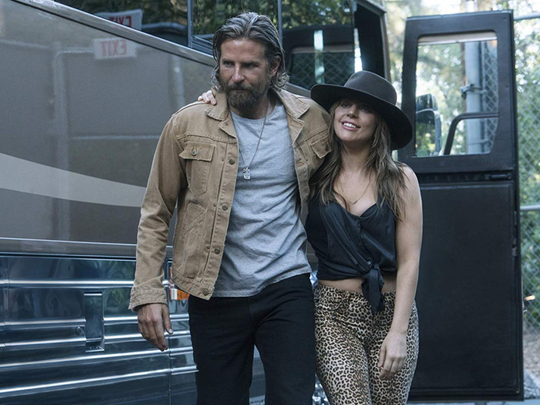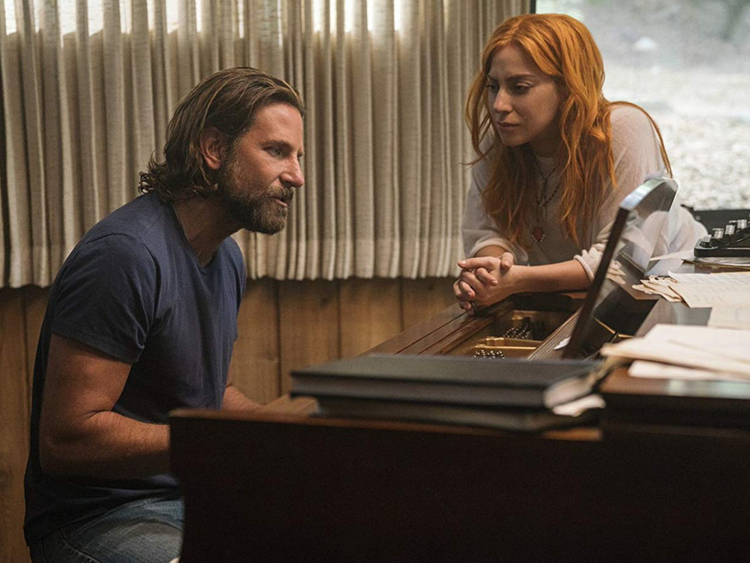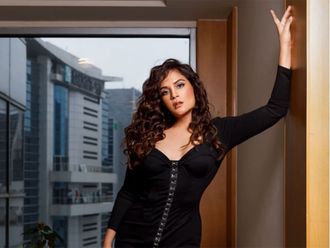
If you’ve so much as grazed the reviews for Bradley Cooper’s full-hearted, grandly entertaining reworking of A Star is Born, you’ve witnessed a lot of critics racking their brains for suitably ecstatic synonyms for “revelation”, ideally in conjunction with some spin or other on the film’s title. The beaming recipient of these superlatives, of course, has been Lady Gaga, whose first big-screen leading role has been hailed as some kind of perspective-shifting force of nature: “We knew she could sing and dance and wear meat with some flair, but who knew she could act?” (At this point, Golden Globe voters may remind us that they gave her an acting prize two years ago; critics will promptly hiss at them to pipe down.)
Gaga is very good indeed in the film, though some of the praise for her performance has misleadingly created the impression of a one-woman show. A Star is Born has always, in all its iterations, been an actors’ duet: just as out-of-the-blue pop star Ally (Gaga) is first enabled, then emboldened and, finally, given a cruel emotional education by dissolute country-gravel growler Jackson Maine (Cooper), it remains a song of female self-realisation that relies, admittedly none too progressively, on male anguish as its bassline.
As with all aspects of his unfussily accomplished directorial debut, Cooper directs his glittering co-star with a sure, generous hand. But his own performance isn’t merely holding up his end of the bargain: it’s pretty damn spectacular in itself, an exercise in old-school movie star swagger with all its flayed masculine insecurities and frayed nerve endings exposed. Couple that with a credible bourbon-rock croon and arena presence, and his performance is as image-expanding in its own way as Gaga’s: it’s not the one that’s hogging the headlines, but it may be the rough, scarred heart of the film.
If no one is calling Cooper’s work on screen revelatory, that’s because it isn’t. Anyone who’s been paying attention is long past being surprised by his unexpected transition from glib Hollywood dude-bro to leading man of sly, soulful conviction; the smarmy yuks of his star-sealing turn in The Hangover feel a lot more than nine years ago. Since then, he’s scooped up three acting Oscar nominations, each one well-earned. David O Russell rightly saw something agitated and unhinged behind the actor’s all-American lacquer, and tapped it to electric effect in Silver Linings Playbook and American Hustle; Clint Eastwood, on the other hand, got Cooper to retreat into his muscular bravado, to brilliantly disquieting effect, as PTSD-raddled military marksman Chris Kyle in American Sniper.
Cooper’s Jackson Maine sits somewhere between what Russell and Eastwood identified in him; at a variety of volumes, he’s become a go-to man for outwardly strapping, inwardly ruptured middle-American masculinity. He may be the least suave or sexy incarnation of the character through the film’s various versions; marked by a cold streak of damage that bubbles all the way up to his mottled pastrami skin — a subtly transformative triumph on the part of the make-up team — it’s a performance that perhaps shares more DNA with the ruined Nashville crooners played by Robert Duvall in Tender Mercies and Jeff Bridges in Crazy Heart. (They both won Oscars; don’t be surprised if Cooper extends the pattern.)
Duvall and Bridges are lofty points of comparison for an actor who, at one point, looked like he might have peaked playing Jennifer Garner’s dorky best friend in Alias. But Cooper, like Bridges in particular, is an actor who has grown more interesting the more he has worked against his golden-boy image, whether destabilising it as feverishly as in Silver Linings Playbook, or playing up the smoothness to sinister, even uncanny effect, as in Limitless. Both those films are unusual showcases for a Hollywood leading man, foregrounding his character’s mental health imbalances ahead of his charms and more stoic weaknesses. Cooper’s willingness to play such damage — not always nobly so, and straying into outright mean territory on more than one occasion — makes him a particularly 21st-century screen idol, a Warren Beatty for the era that recognises and medicates toxic masculinity.
And like Beatty, an actor whose varnished beauty frequently stopped him just short of warmth, Cooper’s transition into filmmaking allows him to control that complicated screen image in newly exciting ways. (It’s also telling that he inherited the Star is Born directing gig from Eastwood, who moved behind the camera to expand a tough-guy screen presence that other filmmakers were less inclined to challenge.) He has already lined up a Leonard Bernstein biopic as his second directorial outing, handing himself the role of the brittle, sexually conflicted composer; you’d call it casting against type if Cooper weren’t already making his “type” such a fragile, fractured notion.
His performance in A Star is Born feels like a complex summation of his career progress to date: a brooding study in traditional maleness, forced into critical self-examination. “Maybe it’s time we let the old ways die,” he keeps singing in a recurring refrain. Lady Gaga may be the film’s revelation, but it’s Cooper we’re invited to reconsider.
__
Don’t miss it
A Star is Born is currently showing across the UAE.














